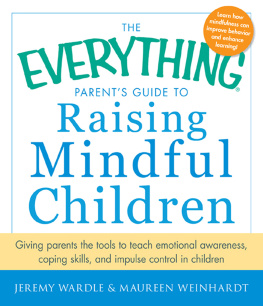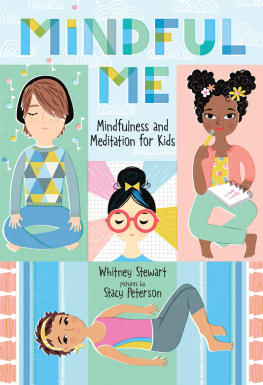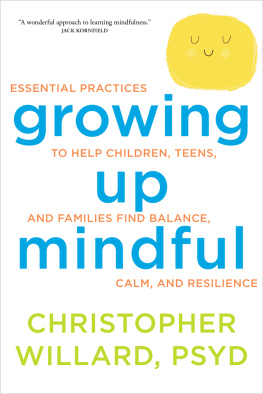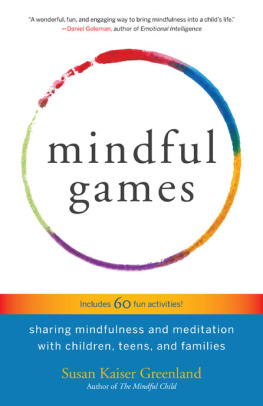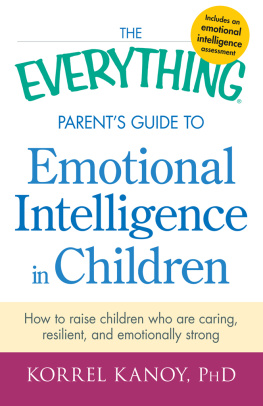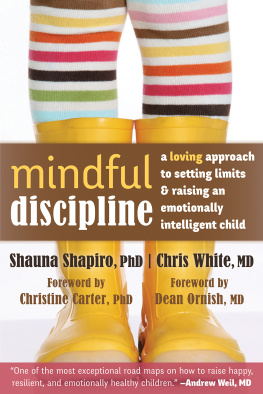Giving parents the tools to teach emotional awareness, coping skills, and impulse control in children
Contents
Mindfulness
The simple act of giving nonjudgmental attention, moment by moment, to ones internal and external environment and experience.
Introduction
BEING A PARENT IS one of the most important jobs a person can take on. Parents shape the future of the world as they shape their children, and to say its demanding is a massive understatement. Unlike almost every other job on the planet, you dont get breaks. You dont get days off. You dont receive training. You often dont even get a full nights sleep. As a parent you are always on, which can be (and often is) completely exhausting and overwhelming.
When your child cries for no apparent reason, turns in disgust from the dinner you have prepared, behaves inappropriately, or ignores your repeated warnings or instructions, it is only natural to get frustrated (and even angry). This book has two significant tools to offer you:
First, there is a wealth of information here to help you better understand your child. Neuroscience and child development can help you gain insight into the why of your childs behavior. When you are aware of how his physical, cognitive, and social-emotional development affect what he is doing, it can be much easier to respond skillfully rather than to react emotionally.
Second, this book will help you teach your child to live a more mindful life, and will raise your self-awareness and show you different ways to deal directly with thoughts and feelings that emerge from your role as a parent. Mindfulness helps you to practice being present within your life, just as it is, and hopefully be more intentional about what you do as a result. As you learn new ways to pay attention, you can be more the parent you want to be.
These tools can help you have more positive and effective interactions with your child, but that is still only half the story. When you understand how your child experiences the world and how he learns, you can communicate in ways that really reach him. This largely happens through modeling, or teaching through example. Doing so allows you to pass on whatever values and lessons are important to you, regardless of your beliefs. By teaching your children to be mindful, you can help them develop the character and qualities that you want to see in them.
For example, the practice of paying attention is an important skill your children can use for the rest of their lives. Many children (and adults) get into trouble because they are not paying attention to the details of what is going on, both around them and inside them. Mindfulness is a powerful way to learn presence and awareness. More than that, it is a practical tool for working with thoughts or feeling instead of ignoring them or getting swept away by them.
In addition, mindfulness practice brings with it a host of other benefits. It has been a hot topic in scientific research for a number of years, and evidence continues to mount demonstrating that mindfulness does much more than simply help you to deal with stress and negative emotions. Research shows that it has very real impacts on the brain, including:
- Strengthening nerve cells
- Increasing overall gray matter density
- Improving connections throughout and across the brain
- Cooling the emotional centers of the brain
- Improving cognitive and executive functioning skills
No matter what goals you have for yourself or your children, having a mindfulness practice can improve how you navigate the landscape of life and relationships.
This book will give you a basic understanding of the brain and child development, the resources you need to begin practicing mindfulness in your life right now, and perhaps even more importantly, practical tools for teaching mindfulness to your children.
For parents, mindfulness can be a powerful tool in improving a familys communication, behavior management strategies, and appreciation of one another. In this way, the art of paying attention can actually strengthen your relationships. The more you practice mindfulness, the more open you will become to embracing every moment of experience as it comes without needing to control it.
So what are you waiting for? Theres no time but the present.
CHAPTER 1
An Introduction to Mindfulness
Mindfulness is the practice of being attentive in every moment, and noticing what is taking place both inside and outside of you without judgment. It is the practice of purposefully seeing your thoughts, emotions, experiences, and surroundings as they arise. Simply put, mindfulness is the act of paying attention. This may seem easy, but the truth is, this is a difficult task for anyone, especially children. After all, there is so much to learn about this world for a child! But instilling mindful behavior in your children will give them the tools for emotional, academic, and social success now and in the future.
Being mindful cultivates awareness and concentration, two incredibly important traits for people of any age. The word mindful draws from three overlapping spheres: the physical, the emotional, and the environmental. These three areas are each processed in the same place, your mind. Together, they create the full realm of human experience. It is important to understand the basic parts of mindfulness, and how they can help both your child and yourself, before taking up this practice yourself or trying to teach it to your children.
Give Your Brain Something to Do!
You have been blessed with a fantastically powerful machine that resides between your ears. In fact, your brain is just about the most sophisticated, adaptable, and powerful machine ever developed. Not only does it control your body, interpret your senses, store your memories, and allow you to communicate through language, it can also learn new things and use what it already knows to create totally new ideas. The tricky thing about this machine is that it is always on and, if not attended to carefully, can easily run amok.

Your brain has no off switch. No matter what you do, it keeps going. Sure, you can distract yourself in all sorts of ways, but your brain just keeps going. It is a biological Energizer Bunny. Even while you sleep, your brain remains busy.
Everyone has experienced this at one point or another: maybe you cant seem to shake a weird feeling, you cant get yourself to stop thinking an unpleasant thought, you cant stop daydreaming about the weekend or what you are going to have for dinner and do once out of work. Some of these thoughts are pleasant, and some of them can be downright scary. You never know what is going to pop into your head when you dont pay attention to what you are doing with your brain, and this is one of the keys to mindfulness.

